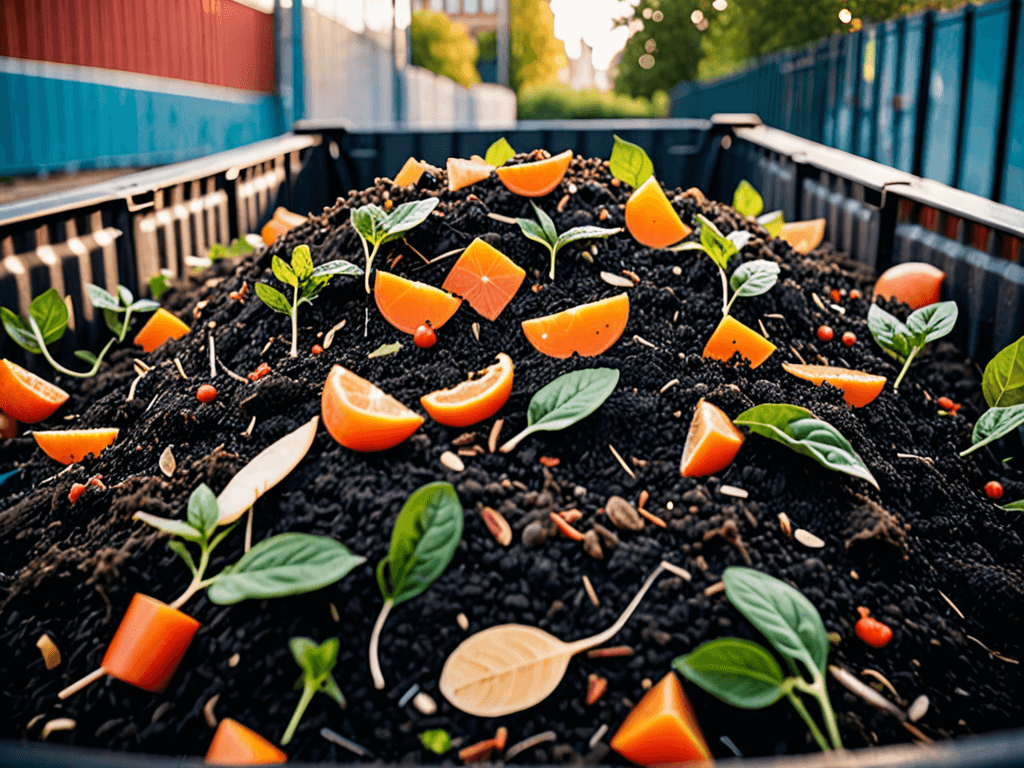Urban Composting is becoming a revolutionary approach to waste management in modern cities.
By transforming organic waste into valuable compost, urban dwellers can significantly reduce landfill contributions and enrich their soil.
In this guide, we delve into the basics of urban composting, explore its vast benefits, and offer practical tips to start this sustainable practice right at home.
Understanding Urban Composting
Urban composting is an effective method of converting household waste into nutrient-rich compost, especially in densely populated areas where space is limited. This practice allows city dwellers to convert fruit peels, vegetable scraps, and other organic materials into a valuable resource for gardens and potted plants.
Composting in urban settings can help reduce landfill waste and promote sustainable urban living. Moreover, understanding the basic principles of composting, such as maintaining a balance of ‘greens’ and ‘browns’, and ensuring proper aeration and moisture, is crucial for successful composting.
By learning these principles, you can maximize the benefits and efficiency of your compost pile right in your apartment or balcony.
Benefits of Composting in Urban Areas
Urban areas often face challenges such as waste disposal and limited green spaces. Urban composting offers solutions to these problems by reducing waste and enriching the soil.
One of the key benefits is the reduction of landfill contributions, which helps minimize environmental pollution and greenhouse gases.
Composting organic waste returns nutrients to the soil, improving its quality and promoting healthier plant growth. Additionally, composting can save money by reducing the need for chemical fertilizers.
Residents can also foster a sense of community by sharing composting practices and results, which can strengthen neighborhood bonds and enhance local green initiatives.
Embracing urban composting can lead to more sustainable city living and foster a healthier environment for all.
How to Start Composting at Home
Starting composting at home is a simple and rewarding process that begins with selecting the right container, such as a compost bin or pile. Ensure your chosen spot is easily accessible and has good drainage. Begin by layering organic materials, alternating between green and brown waste. Green waste includes food scraps and grass clippings, while brown waste consists of dried leaves and twigs. Regularly turning the pile with a garden fork helps to aerate and speed up decomposition. Keep the compost moist but not soggy, aiming for the consistency of a damp sponge. Patience is key, as it takes time for organic materials to break down into nutrient-rich compost. Monitor the pile regularly to maintain balance and adjust as necessary for optimal results.
Composting Materials You Can Use
When it comes to composting, selecting the right materials is crucial for success.
Green materials, like fruit and vegetable scraps, are rich in nitrogen and essential for decomposing quickly. Coffee grounds and eggshells are also great green materials.
On the other hand, brown materials like fallen leaves, shredded paper, and sawdust add carbon to the mix, which is necessary for balance.
Avoid using meat, dairy, and oils in your compost, as they can attract pests and create odors. It’s also wise to steer clear of diseased plants and glossy paper.
By combining a variety of these materials, you can maintain the ideal balance of carbon and nitrogen, ensuring efficient breakdown and a healthy final compost product.
Common Urban Composting Mistakes
Urban composting can be straightforward, but common pitfalls may hinder progress.
One mistake is not balancing green and brown materials, which can slow decomposition and cause odors.
Overwatering your compost is another frequent error, leading to sogginess and lack of air circulation.
On the flip side, a dry pile stops microbial activity.
It’s essential to regularly turn your compost to introduce oxygen, supporting healthy breakdown.
Adding non-compostable items like plastics or metals is a big mistake.
These materials do not decompose and can contaminate the compost.
Understanding these common mistakes allows you to create effective, nutrient-rich compost in urban environments.
Innovative Urban Composting Techniques
Exploring innovative urban composting techniques can enhance recycling efforts in crowded cities. One effective method is using worm composting, or vermiculture, which employs worms to break down organic waste swiftly. This technique is ideal for apartments due to its compact nature and ability to handle food scraps efficiently. Bokashi composting is another revolutionary method that uses fermentation with microorganisms to compost waste, including meat and dairy. It’s suitable for indoor use and reduces composting odors significantly.
Community composting bins represent a social approach, allowing urban neighborhoods to collaborate on larger-scale composting efforts. These techniques not only contribute to zero waste goals but also support urban gardening and sustainability initiatives.
Environmental Impact of Urban Composting
Urban composting has a significant positive environmental impact by reducing waste sent to landfills. This reduction diminishes methane emissions, which are potent greenhouse gases contributing to climate change. By converting kitchen scraps and yard waste into valuable compost, urban dwellers decrease their carbon footprint.
The process of composting enriches soil, promoting healthier plant growth and reducing the need for synthetic fertilizers, which can contaminate waterways. Additionally, urban composting helps conserve landfill space and lowers the community waste management costs, fostering sustainable city living.
These benefits illustrate the vital role composting plays in supporting ecological balance and reducing urban environmental stress.
Urban Composting Tools and Kits
Choosing the right tools and kits for urban composting can make the process more efficient and convenient. A popular option is the compost tumbler, which allows for easy mixing and faster decomposition due to its rotating design. For smaller spaces, a compact kitchen compost bin with a charcoal filter can effectively manage odor and store food scraps before transferring to a larger system. Vermiculture kits are also available, often including instructions and tools necessary for worm composting. These kits usually come with bedding material and a proper container. Bokashi composting starter kits often include a bucket and bran to aid the fermentation process. These diverse tools and kits make urban composting accessible, no matter the space constraints.
Embracing Urban Composting
Urban composting offers numerous environmental and personal benefits, making it an essential practice for sustainable living in cities.
From reducing waste and greenhouse gases to enriching soil and fostering community spirit, composting plays a vital role in urban ecology.
Starting your composting journey involves understanding the right materials and methods, and learning from common mistakes.
With the right tools and innovative techniques, even those in small spaces can contribute to environmental well-being.
As more people embrace urban composting, the collective impact can be profound, helping cities transition towards greener, more sustainable futures.
Join the movement and begin transforming waste into a valuable resource today.
FAQ – Urban Composting
What is urban composting?
Urban composting is the practice of turning organic waste into compost within a city environment.
Why is urban composting important?
It helps reduce landfill waste, lowers greenhouse gas emissions, and enriches soil for gardening.
What can I compost in an urban setting?
You can compost fruit and vegetable scraps, coffee grounds, eggshells, wilted flowers, and shredded paper.
What tools do I need to start composting at home?
Basic tools include a compost bin or tumbler, a small kitchen scrap container, and a pitchfork for turning the compost.
How long does composting take in an urban environment?
Composting typically takes several months, depending on the method used and the balance of composting materials.
Can composting be done inside an apartment?
Yes, with methods like vermiculture or bokashi that are suitable for indoor use.
What should I avoid putting in my compost bin?
Avoid meat, dairy, oils, and any non-organic or treated waste as they can attract pests and disrupt composting.


